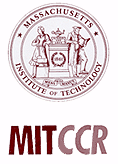 |

|
|
A recent new development in which MIT plays a leading role is the development of animal models for human disease. Professor Tyler Jacks and his colleagues (as well as Dr. Weinberg's) have generated engineered transgenic mice mutated in various tumor suppressor genes and Professors Hynes and Tonegawa have generated mutant mice with defects in genes thought to be involved in invasion, metastasis and tumor progression. These mutant mice are proving invaluable for studies of cancer, as well as other diseases. A recent example comes from work of the Jacks and Housman laboratories using cells from mice lacking p53, the most commonly mutated tumor suppressor gene in human cancer. Such mice rapidly develop tumors and the cells from them are resistant to chemotherapeutic or radiation treatments. These studies offer promise for understanding the resistance of cancer cells to therapeutic treatments and for designing ways to improve the therapies.
The research in the CCR at MIT is built on our strengths in molecular biology, genetics, cell biology and immunology. Truly novel advances in cancer research come from deeper understanding of the molecular and cellular bases of cancer. Basic research leads to the discovery of new targets for therapy and new diagnostics and offers one of the best hopes for combatting cancer. Transfer of the basic science results to the clinic and to the biotechnology industry is important for the development of these research discoveries to useful applications and MIT has also been a leader in technology transfer and in establishing the biotechnology industry. |
|